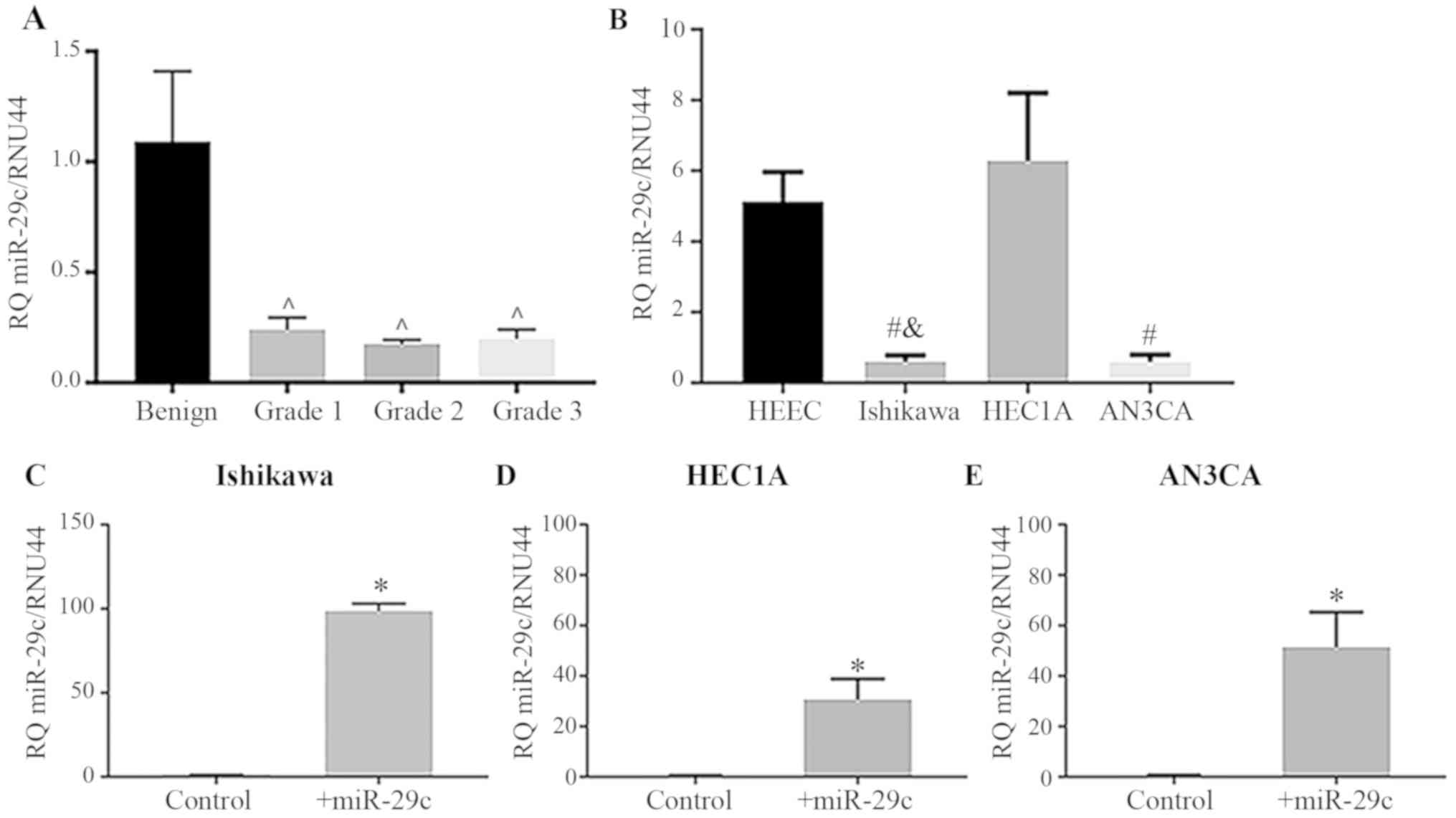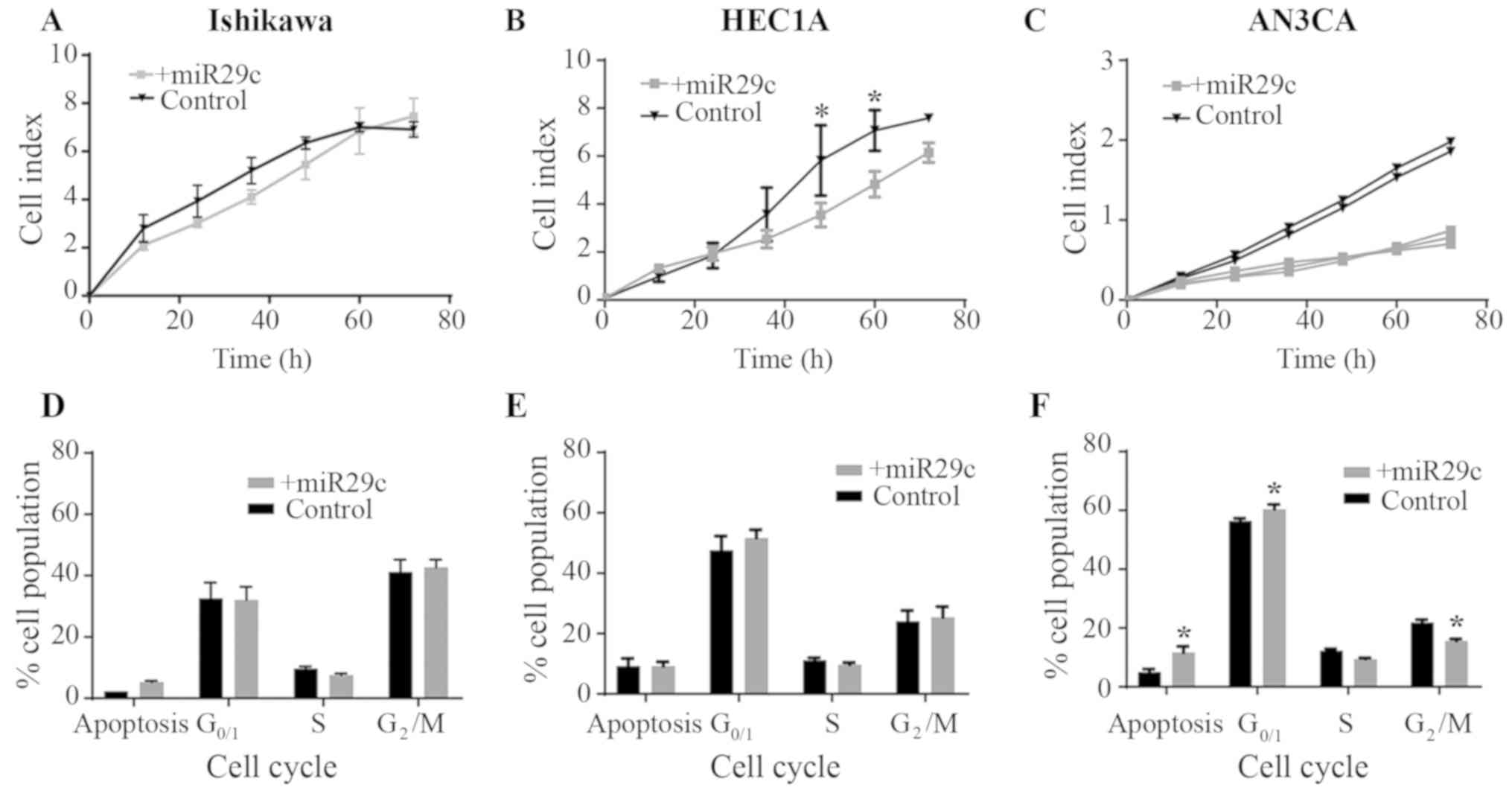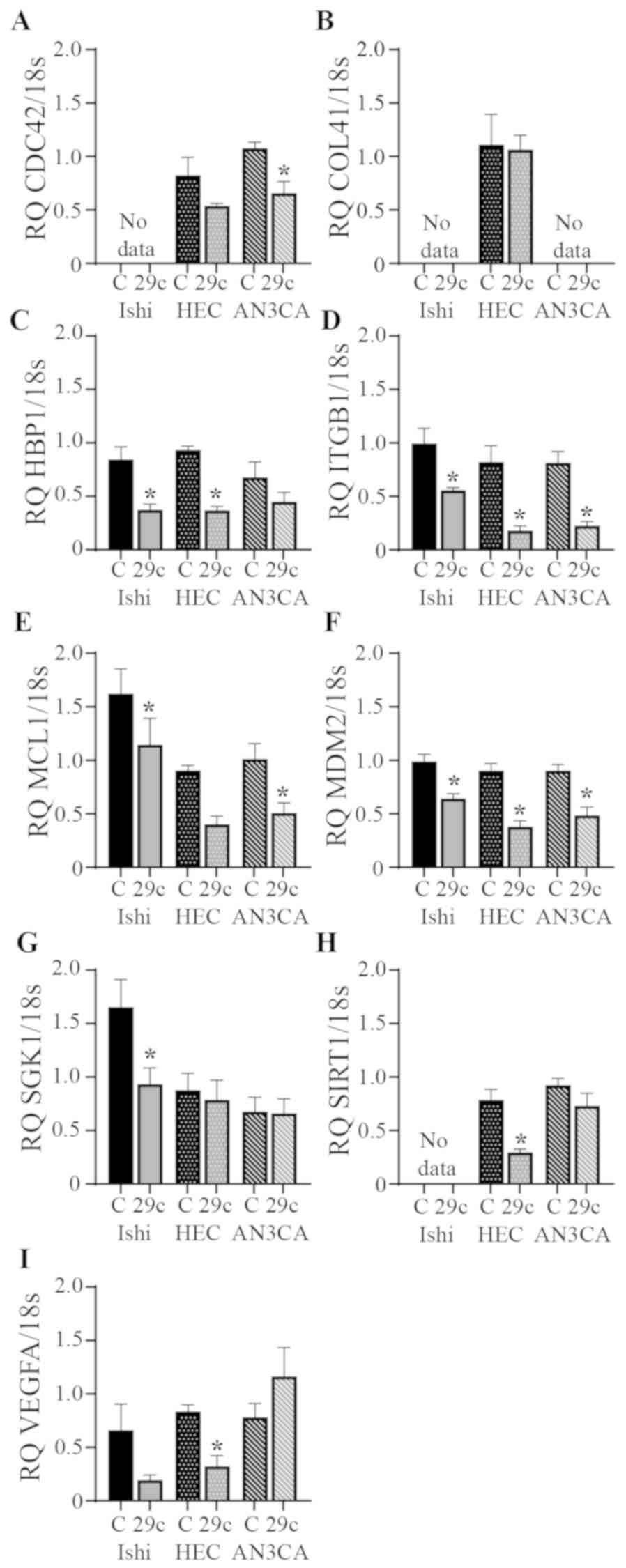|
1
|
Ferlay J, Shin HR, Bray F, Forman D,
Mathers C and Parkin DM: Estimates of worldwide burden of cancer in
2008: GLOBOCAN 2008. Int J Cancer. 127:2893–2917. 2010. View Article : Google Scholar : PubMed/NCBI
|
|
2
|
Soliman PT, Oh JC, Schmeler KM, Sun CC,
Slomovitz BM, Gershenson DM, Burke TW and Lu KH: Risk factors for
young premenopausal women with endometrial cancer. Obstet Gynecol.
105:575–580. 2005. View Article : Google Scholar : PubMed/NCBI
|
|
3
|
Bilyk O, Coatham M, Jewer M and Postovit
LM: Epithelial-to-Mesenchymal Transition in the female reproductive
tract: From normal function to disease pathology. Front Oncol.
7:1452017. View Article : Google Scholar : PubMed/NCBI
|
|
4
|
Hong B, Le Gallo M and Bell DW: The
mutational landscape of endometrial cancer. Curr Opin Genet Dev.
30:25–31. 2015. View Article : Google Scholar : PubMed/NCBI
|
|
5
|
Di Cristofano A and Ellenson LH:
Endometrial carcinoma. Annu Rev Pathol. 2:57–85. 2007. View Article : Google Scholar : PubMed/NCBI
|
|
6
|
Piulats JM, Guerra E, Gil-Martin M,
Roman-Canal B, Gatius S, Sanz-Pamplona R, Velasco A, Vidal A and
Matias-Guiu X: Molecular approaches for classifying endometrial
carcinoma. Gynecol Oncol. 145:200–207. 2017. View Article : Google Scholar : PubMed/NCBI
|
|
7
|
Arend RC, Jones BA, Martinez A and
Goodfellow P: Endometrial cancer: Molecular markers and management
of advanced stage disease. Gynecol Oncol. 150:569–580. 2018.
View Article : Google Scholar : PubMed/NCBI
|
|
8
|
Kim VN: MicroRNA biogenesis: Coordinated
cropping and dicing. Nat Rev Mol Cell Biol. 6:376–385. 2005.
View Article : Google Scholar : PubMed/NCBI
|
|
9
|
Schmitt MJ, Margue C, Behrmann I and Kreis
S: MiRNA-29: A microRNA family with tumor-suppressing and
immune-modulating properties. Curr Mol Med. 13:572–585. 2013.
View Article : Google Scholar : PubMed/NCBI
|
|
10
|
Castilla MÁ, Moreno-Bueno G, Romero-Pérez
L, Van De Vijver K, Biscuola M, López-García MÁ, Prat J,
Matías-Guiu X, Cano A, Oliva E and Palacios J: Micro-RNA signature
of the epithelial-mesenchymal transition in endometrial
carcinosarcoma. J Pathol. 223:72–80. 2011. View Article : Google Scholar : PubMed/NCBI
|
|
11
|
Chen HX, Xu XX, Tan BZ, Zhang Z and Zhou
XD: Micro-RNA-29b inhibits angiogenesis by targeting VEGFA through
the MAPK/ERK and PI3K/Akt signaling pathways in endometrial
carcinoma. Cell Physiol Biochem. 41:933–946. 2017. View Article : Google Scholar : PubMed/NCBI
|
|
12
|
Hiroki E, Akahira J, Suzuki F, Nagase S,
Ito K, Suzuki T, Sasano H and Yaegashi N: Changes in microRNA
expression levels correlate with clinicopathological features and
prognoses in endometrial serous adenocarcinomas. Cancer Sci.
101:241–249. 2010. View Article : Google Scholar : PubMed/NCBI
|
|
13
|
Jiang T, Sui D, You D, Yao S, Zhang L,
Wang Y, Zhao J and Zhang Y: miR-29a-5p inhibits proliferation and
invasion and induces apoptosis in endometrial carcinoma via
targeting TPX2. Cell Cycle. 17:1268–1278. 2018. View Article : Google Scholar : PubMed/NCBI
|
|
14
|
Ushakov DS, Dorozhkova AS, Babayants EV,
Ovchinnikov VY, Kushlinskii DN, Adamyan LV, Gulyaeva LF and
Kushlinskii NE: Expression of microRNA potentially regulated by AhR
and CAR in malignant tumors of the endometrium. Bull Exp Biol Med.
165:688–691. 2018. View Article : Google Scholar : PubMed/NCBI
|
|
15
|
Mazzoccoli L, Robaina MC, Apa AG, Bonamino
M, Pinto LW, Queiroga E, Bacchi CE and Klumb CE: MiR-29 silencing
modulates the expression of target genes related to proliferation,
apoptosis and methylation in Burkitt lymphoma cells. J Cancer Res
Clin Oncol. 144:483–497. 2018. View Article : Google Scholar : PubMed/NCBI
|
|
16
|
Griffiths M, Van Sinderen M, Rainczuk K
and Dimitriadis E: miR-29c overexpression and COL4A1 downregulation
in infertile human endometrium reduces endometrial epithelial cell
adhesive capacity in vitro implying roles in receptivity.
Sci Rep. 9:86442019. View Article : Google Scholar : PubMed/NCBI
|
|
17
|
Long M, Wan X, La X, Gong X and Cai X:
miR-29c is downregulated in the ectopic endometrium and exerts its
effects on endometrial cell proliferation, apoptosis and invasion
by targeting c-Jun. Int J Mol Med. 35:1119–1125. 2015. View Article : Google Scholar : PubMed/NCBI
|
|
18
|
Marwood M, Visser K, Salamonsen LA and
Dimitriadis E: Interleukin-11 and leukemia inhibitory factor
regulate the adhesion of endometrial epithelial cells: Implications
in fertility regulation. Endocrinology. 150:2915–2923. 2009.
View Article : Google Scholar : PubMed/NCBI
|
|
19
|
Winship A, Van Sinderen M, Rainczuk K and
Dimitriadis E: Therapeutically blocking Interleukin-11
Receptor-alpha enhances doxorubicin cytotoxicity in high grade type
I endometrioid tumours. Oncotarget. 8:22716–22729. 2017. View Article : Google Scholar : PubMed/NCBI
|
|
20
|
Van Sinderen M, Cuman C, Winship A,
Menkhorst E and Dimitriadis E: The chrondroitin sulfate
proteoglycan (CSPG4) regulates human trophoblast function.
Placenta. 34:907–912. 2013. View Article : Google Scholar : PubMed/NCBI
|
|
21
|
Livak K and Schmittgen T: Analysis of
relative gene expression data using real-time quantitative PCR and
the 2(-Delta DeltaC(T)) method. Methods. 25:402–408. 2001.
View Article : Google Scholar : PubMed/NCBI
|
|
22
|
Licholai S, Szczekilk W and Sanak M:
miR-29c-3p is an effective biomarker of abdominal aortic aneurysm
in patients undergoing elective surgery. MicroRNA. 5:124–131. 2016.
View Article : Google Scholar : PubMed/NCBI
|
|
23
|
Xu Z, Zou L, Gang M, Wu X, Huang F, Feng
T, Li S, Lin Q, He X, Liu Z and Cao X: Integrin b1 is a critical
effector in promoting metastasis and chemo-resistance of esophageal
squamous cell carcinoma. Am J Cancer Res. 7:531–542.
2017.PubMed/NCBI
|
|
24
|
Gupta A, Shah K, Oza MJ and Behl T:
Reactivation of p53 gene by MDM2 inhibitors: a novel therapy for
cancer treatment. Biomed Pharmacother. 109:484–492. 2019.
View Article : Google Scholar : PubMed/NCBI
|
|
25
|
Weigelt B, Warne PH, Lambros MB,
Reis-Filho JS and Downward J: PI3K pathway dependencies in
endometrial cancer cell lines. Clin Cancer Res. 19:3533–3544. 2013.
View Article : Google Scholar : PubMed/NCBI
|
|
26
|
Bhardwaj A, Singh H, Rajapakshe K,
Tachibana K, Ganesan N, Pan Y, Gunaratne PH, Coarfa C and Bedrosian
I: Regulation of miRNA-29c and its downstream pathways in
preneoplastic progression of triple-negative breast cancer.
Oncotarget. 8:19645–19660. 2017. View Article : Google Scholar : PubMed/NCBI
|
|
27
|
Chen G, Zhou T, Li Y, Yu Z and Sun L: p53
target miR-29c-3p suppresses colon cancer cell invasion and
migration through inhibition of PHLDB2. Biochem Biophys Res Commun.
487:90–95. 2017. View Article : Google Scholar : PubMed/NCBI
|
|
28
|
Chuang TD and Khorram O: Mechanisms
underlying aberrant expression of miR-29c in uterine leiomyoma.
Fertil Steril. 105:236–245 e1. 2016. View Article : Google Scholar : PubMed/NCBI
|
|
29
|
He B, Xiao YF, Tang B, Wu YY, Hu CJ, Xie
R, Yang X, Yu ST, Dong H, Zhao XY, et al: hTERT mediates gastric
cancer metastasis partially through the indirect targeting of ITGB1
by microRNA-29a. Sci Rep. 6:219552016. View Article : Google Scholar : PubMed/NCBI
|
|
30
|
Chen J, Gu L, Ni J, Hu P, Hu K and Shi YL:
MiR-183 Regulates ITGB1P Expression and Promotes Invasion of
Endometrial Stromal Cells. Biomed Res Int.
2015:3402182015.PubMed/NCBI
|
|
31
|
Jiang Z, Xu W, Dan G, Liu Y and Xiong J:
P53 and murine double mimute 2 (MDM2) expression changes and
significance in different types of endometrial lesions. Med Sci
Monit. 22:4786–4793. 2016. View Article : Google Scholar : PubMed/NCBI
|
|
32
|
Bollaert E, de Rocca Serra A and Demoulin
JB: The HMG box transcription factor HBP1: A cell cycle inhibitor
at the crossroads of cancer signaling pathways. Cell Mol Life Sci.
76:1529–1539. 2019. View Article : Google Scholar : PubMed/NCBI
|
|
33
|
He S, Yang S, Niu M, Zhong Y, Dan Gao,
Zhang Y, Ma H, Xiong W, Zhou M, Zhou Y, et al: HMG-box
transcription factor 1: A positive regulator of the G1/S transition
through the Cyclin-CDK-CDKI molecular network in nasopharyngeal
carcinoma. Cell Death Dis. 9:1002018. View Article : Google Scholar : PubMed/NCBI
|
|
34
|
Conza D, Mirra P, Cali G, Tortora T,
Insabato L, Fiory F, Schenone S, Amato R, Beguinot F, Perrotti N
and Ulianich L: The SGK1 inhibitor SI113 induces autophagy,
apoptosis, and endoplasmic reticulum stress in endometrial cancer
cells. J Cell Physiol. 232:3735–3743. 2017. View Article : Google Scholar : PubMed/NCBI
|
|
35
|
Palmirotta R, Cives M, Della-Morte D,
Capuani B, Lauro D, Guadagni F and Silvestris F: Sirtuins and
cancer: role in the epithelial-mesenchymal transition. Oxid Med
Cell Longev. 2016:30314592016. View Article : Google Scholar : PubMed/NCBI
|
|
36
|
Bartosch C, Monteiro-Reis S, Almeida-Rios
D, Vieira R, Castro A, Moutinho M, Rodrigues M, Graça I, Lopes JM
and Jerónimo C: Assessing sirtuin expression in endometrial
carcinoma and non-neoplastic endometrium. Oncotarget. 7:1144–1154.
2016. View Article : Google Scholar : PubMed/NCBI
|
|
37
|
Asaka R, Miyamoto T, Yamada Y, Ando H,
Mvunta DH, Kobara H and Shiozawa T: Sirtuin 1 promotes the growth
and cisplatin resistance of endometrial carcinoma cells: A novel
therapeutic target. Lab Invest. 95:1363–1373. 2015. View Article : Google Scholar : PubMed/NCBI
|
|
38
|
Bae HJ, Noh JH, Kim JK, Eun JW, Jung KH,
Kim MG, Chang YG, Shen Q, Kim SJ, Park WS, et al: MicroRNA-29c
functions as a tumor suppressor by direct targeting oncogenic SIRT1
in hepatocellular carcinoma. Oncogene. 33:2557–2567. 2014.
View Article : Google Scholar : PubMed/NCBI
|
|
39
|
Mahecha AM and Wang H: The influence of
vascular endothelial growth factor-A and matrix metalloproteinase-2
and −9 in angiogenesis, metastasis, and prognosis of endometrial
cancer. Onco Targets Ther. 10:4617–4624. 2017. View Article : Google Scholar : PubMed/NCBI
|
|
40
|
Park SY, Lee JH, Ha M, Nam JW and Kim VN:
miR-29 miRNAs activate p53 by targeting p85 alpha and CDC42. Nat
Struct Mol Biol. 16:23–29. 2009. View Article : Google Scholar : PubMed/NCBI
|
|
41
|
Qadir MI, Parveen A and Ali M: Cdc42: Role
in cancer management. Chem Biol Drug Des. 86:432–439. 2015.
View Article : Google Scholar : PubMed/NCBI
|
|
42
|
Ye H, Zhang Y, Geng L and Li Z: Cdc42
expression in cervical cancer and its effects on cervical tumor
invasion and migration. Int J Oncol. 46:757–763. 2015. View Article : Google Scholar : PubMed/NCBI
|
|
43
|
Feng Y, Fang S and Li M: Expression of
P21-activated kinase 1 and cell division control protein 42 homolog
correlates with clinicopathological features and prognosis in
cervical carcinoma. J Obstet Gynaecol Res. 42:860–869. 2016.
View Article : Google Scholar : PubMed/NCBI
|
|
44
|
Shi C, Ren L, Sun C, Yu L, Bian X, Zhou X,
Wen Y, Hua D, Zhao S, Luo W, et al: miR-29a/b/c function as
invasion suppressors for gliomas by targeting CDC42 and predict the
prognosis of patients. Br J Cancer. 117:1036–1047. 2017. View Article : Google Scholar : PubMed/NCBI
|
|
45
|
Yang D, Zhang Y, Cheng Y, Hong L, Wang C,
Wei Z, Cai Q and Yan R: High expression of cell division cycle 42
promotes pancratic cancer growth and predicts poor outcome of
pancreatic cancer patients. Dig Dis Sci. 62:958–967. 2017.
View Article : Google Scholar : PubMed/NCBI
|
|
46
|
Kamai T, Yamanishi T, Shirataki H, Takagi
K, Asami H, Ito Y and Yoshida K: Overexpression of RhoA, Rac1 and
Cdc42 GTPases is associated with progression in testicular cancer.
Clin Cancer Res. 10:4799–4805. 2004. View Article : Google Scholar : PubMed/NCBI
|
|
47
|
Konno Y, Dong P, Xiong Y, Suzuki F, Lu J,
Cai M, Watari H, Mitamura T, Hosaka M, Hanley SJ, et al:
MicroRNA-101 targets EZH2, MCL-1 and FOS to suppress proliferation,
invasion and stem cell-like phenotype of aggressive endometrial
cancer cells. Oncotarget. 5:6049–6062. 2014. View Article : Google Scholar : PubMed/NCBI
|
|
48
|
Simmen F, Su Y, Xiao R, Zeng Z and Simmen
RC: The Kruppel-like factor 9 (KLF9) network in HEC-1-A endometrial
carcinoma cells suggests the carcinogenic potential of
dys-regulated KLF9 expression. Reprod Biol Endocrinol. 6:412008.
View Article : Google Scholar : PubMed/NCBI
|
|
49
|
Menkhorst E, Griffiths M, Van Sinderen M,
Rainczuk K, Niven K and Dimitriadis E: Galectin-7 is elevated in
endometrioid (type I) endometrial cancer and promotes cell
migration. Oncol Lett. 16:4721–4728. 2018.PubMed/NCBI
|
|
50
|
Van Agtmael T and Bruckner-Tuderman L:
Basement membranes and human disease. Cell Tissue Res. 339:167–188.
2010. View Article : Google Scholar : PubMed/NCBI
|
|
51
|
Kelly FD, Tawia SA and Rogers PA:
Immunohistochemical characterization of human endometrial
microvascular basement membrane components during the normal
menstrual cycle. Hum Reprod. 10:268–276. 1995. View Article : Google Scholar : PubMed/NCBI
|


















